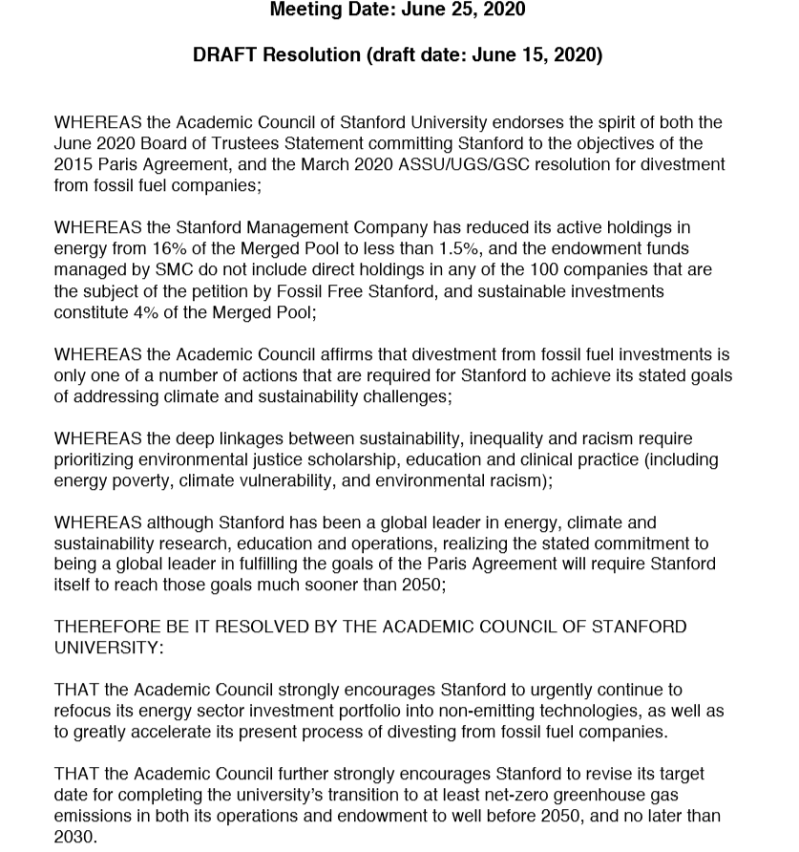At a special session on Thursday, the Academic Council debated a resolution to call on the University to accelerate “its present process of divesting from fossil fuel companies” and its transition to net-zero greenhouse gas emissions. The meeting did not meet the quorum required to vote on the resolution.
The meeting of the Academic Council — which includes all tenure-line faculty — comes after the University announced that it would not divest from fossil fuels, but instead committed to reach net-zero greenhouse gas emissions by 2050. On May 28, the Faculty Senate — which includes only a subset of the faculty — voted down a non-binding resolution that would have called on the University to commit to divestment.
While faculty at the meeting agreed that dramatic action is needed in order to address climate change, they debated whether divestment from the fossil fuel industry is the University’s best option.
“I’ve spent some time reading the comments and presentations made in the Faculty Senate on May 28,” said Jeff Koseff, a civil and environmental engineering professor who co-founded the Stanford Woods Institute for the Environment. “My conclusion from reading the comments is that few, if any, minimize the critical need to address climate change and to do it urgently.”
Koseff spoke in favor of the resolution, arguing that the University’s actions “are far broader and deeper than just Stanford’s investment portfolio.”
Energy resources engineering professor Hamdi Tchelepi expressed his opposition to divestment, saying the University should not stop sharing ideas and resources with fossil fuel companies.
“We are committed to transforming the global energy system, and it is counterproductive in my opinion to approach it with divestment, because it’s based on exclusion, as opposed to opening things up to inclusivity and complete exchange of dialogue and resources,” he said.
Arun Majumdar, a co-director of the Precourt Institute for Energy, agreed that fossil fuel companies need to be part of finding solutions to address climate change. Majmudar advised the council “not to have just aspirational goals that we cannot meet in a cost-effective way.”
“Just to just remind people, this is a gigaton-scale problem that we’re dealing with,” he said. “And to think that we can get there quickly without gigaton scale industries is unrealistic.”
Larry Diamond, a senior fellow at the Freeman Spogli Institute, said that divestment didn’t necessarily have to come at the expense of the University’s relationship to fossil fuel companies.
“We don’t have to cease positive engagement with the oil companies just because we implement this resolution,” Diamond said.
Diamond also said it is important to consider that climate change will have more severe impacts on people in developing countries.
“The people who are going to suffer the most if we don’t slow down carbon emissions are the people in poor countries, tropical zones in the developing world that are being hit hardest by climate change,” he said.
Art history professor Srdan Keca agreed that conversations about divestment need to focus on the impact of climate change in the global south.
“As a documentary filmmaker I spent most of my time with some of the poorest people on this planet,” Keca said. “I have identified no mechanisms in their lives by which they benefit from Stanford’s continued investment in fossil fuel companies.”
Faculty at the meeting also discussed the University’s commitment to achieving net-zero emissions by 2050, in line with the 2015 Paris Accords. The Board of Trustees announced the commitment earlier this month, along with the decision to not divest from fossil fuels.
Earth system science professor Noah Diffenbaugh stressed the need for Stanford to accelerate emissions reductions to reach the target.
“The reality is that a future in which institutions like Stanford reach net zero by 2050 is also a future in which the world reaches net zero much later than 2050,” Diffenbaugh said. “To achieve the goals of the 2015 Paris Agreement Stanford itself will need to reach net zero in investments and operations well before 2050.”
Contact Michael Espinosa at mesp2021 ‘at’ stanford.edu.
